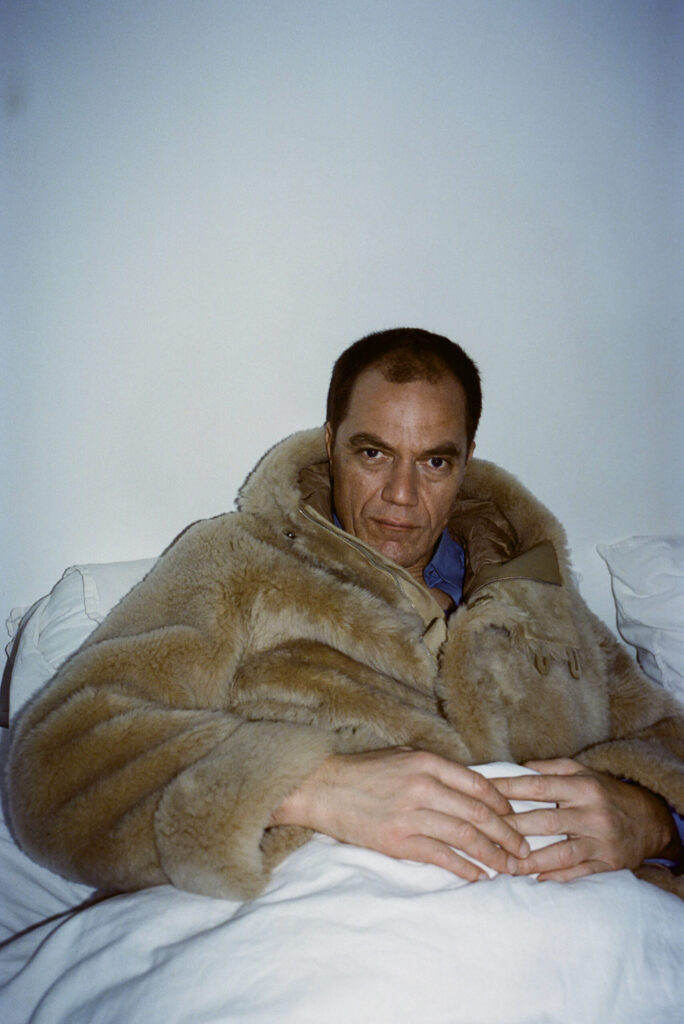Emilio Parka in Hay Bales Loro Piana. Vintage Loro Piana Shirt Talent’s Own.
Documentarian Joshua Oppenheimer’s first narrative feature, The End, is an outlandish, post-apocalyptic musical that stars Michael Shannon as Father, an energy scion at the helm of an elite family of survivors, still living amongst their treasured possessions (just now in an underground bunker). Grappling with guilt, parenthood, and a stranger poking around outside, Shannon puts his permanent expression of bewilderment to good use, whilst singing to the tune of the world’s end. The role probably couldn’t have been a better fit for the beloved Southern actor, an eccentric who’s spent his life deeply immersed in music, and a permanent state of anxiety about climate change. “I try to pick things that are provocative and make people consider our common trials and tribulations, because I know that I’m not going to be the one that comes up with the molecule that replaces the atmosphere or somehow gets greenhouse gases to disappear,” he told his friend and former co-star Austin Butler on a call just before the new year. “The only thing I can really do is, through my work, try to keep these concerns at the forefront.” In conversation, the two went deep on Shannon’s eternal love of jazz, coming up in Chicago’s “spontaneous theatre” scene, and whether or not he’ll one day host Saturday Night Live.
———
MICHAEL SHANNON: Hey, man.
AUSTIN BUTLER: Hey.
SHANNON: Where are you at?
BUTLER: I’m in Los Angeles. Are you in New York?
SHANNON: Yeah, I’m in New York. I’m just home for the holidays, taking it easy.
BUTLER: That’s nice. How lovely.
SHANNON: Are you working?
BUTLER: I just finished working in New York, actually. I was working on a Darren Aronofsky film, so I just got back to Los Angeles about two weeks ago.
SHANNON: Oh, wow. Cool. What were you doing with him?
BUTLER: We’re doing this movie that’s based on a novel called Caught Stealing. It’s basically a thriller that takes place in the ’90s in New York.
SHANNON: Okay.
BUTLER: Yeah. I think the last time you and I saw each other was in New York when we saw Jodie Comer’s play, Prima Facie.
SHANNON: Oh, right. Was that before or after Godot?
BUTLER: Oh, that must have been before, because the next thing I was going to say is, I don’t know if I got to tell you how brilliant you were in Waiting for Godot.
SHANNON: Oh, thank you. I know you came, but I don’t think we got to visit afterwards.
BUTLER: You and Paul both were just extraordinary. It was a work of creative, comedic, and dramatic genius.
SHANNON: Oh, thank you, Austin. Thank you for coming.
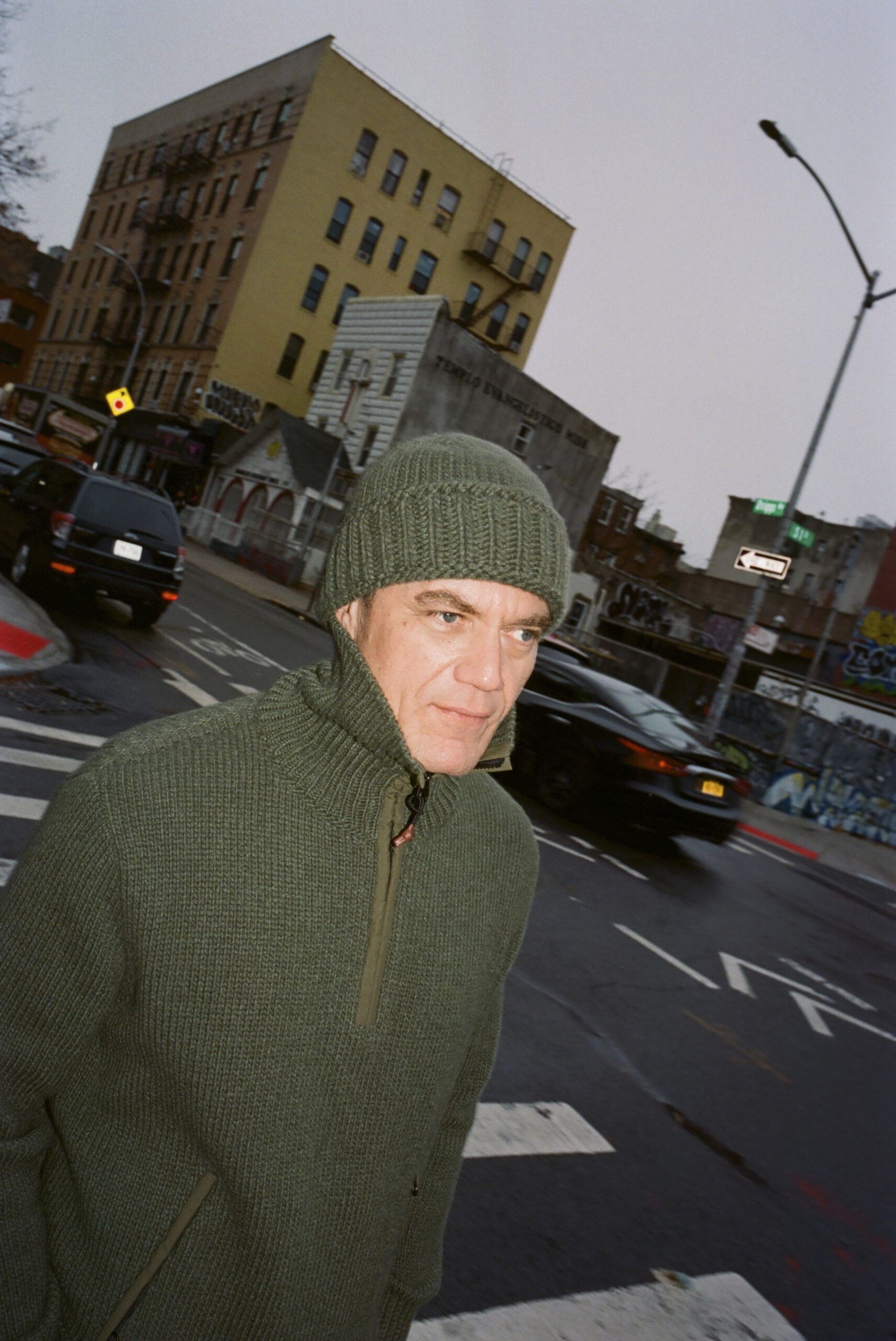
Alpe di Mera Halfneck Sweater in Green Under Water and Alpe di Mera Beanie in Green Under Water by Loro Piana.
BUTLER: I thought about it for weeks and weeks after. It really stuck with me as one of my favorite performances I’ve seen in a long time. But I’m bummed I never got to see you in Bug or Killer Joe or these performances that have gone down in history.
SHANNON: Yeah, that was a while ago. Somebody just was talking about Killer Joe last night, but that was back in ’98.
BUTLER: Well, I know you’ve probably been answering the same questions over and over, so I wanted to do this differently today. Maybe you want to talk about music a little bit?
SHANNON: Oh, okay. I’m up for that.
BUTLER: I texted Jeff Nichols and Paul Sparks and I said, “Peel back the layers of Mike Shannon for me a little bit.” I said, “What questions would you have for him?” And one thing Paul Sparks told me is how much you love jazz.
SHANNON: I do. I mean, I love all genres of music, but jazz is probably at the tip-top for me, and I love being here in New York City and getting to go to the Village Vanguard. And I love the fact that every time I try to get tickets there, it’s sold out, which means that people are still going and people still care about that music.
BUTLER: I was just having a conversation with a buddy the other day who’s going to be opening a jazz bar in London, and he was saying that he noticed that in a lot of these jazz places, you can’t have conversations now. It’s very much a performance, and he said, “But jazz is one of those forms of music that is actually the most conversational.” And it started making me think, “Well, if you were having a great conversation, what would be some of the best jazz albums to have on?”
SHANNON: Well, clubs now have these no conversation policies, which I understand because they’re concentrating pretty hard and trying to come up with a miracle, basically. I can’t imagine there was less respect back then, but I guess it wasn’t as sanctified as it seems to be nowadays. But if you listen to a lot of old live records you hear conversations on them. It always cracks me up when I hear these old records that are just legendary masterpiece performances and people are just sitting there shooting the shit. But there’s so many records I could think of. A lot of times when I’m doing acting stuff, I find music to inspire me based on whatever it is I’m doing.
BUTLER: Do you play jazz at all? Because I know you sing.
SHANNON: Yeah, I was in a jazz band when I was in high school. I played the bass, but that was just for a couple of years.
BUTLER: Okay. And then you play guitar as well, right?
SHANNON: Yeah, but I never studied it formally. I feel like every actor plays a damn guitar.
BUTLER: It’s an easy thing to bring around with you. I haven’t been on this side of the interview process, getting to interview somebody else, even though this just feels like having a conversation, but it meant that I got to spend the last week going on a deep dive of Michael Shanon and [Shannon’s band] Corporal–
SHANNON: Oh, boy.
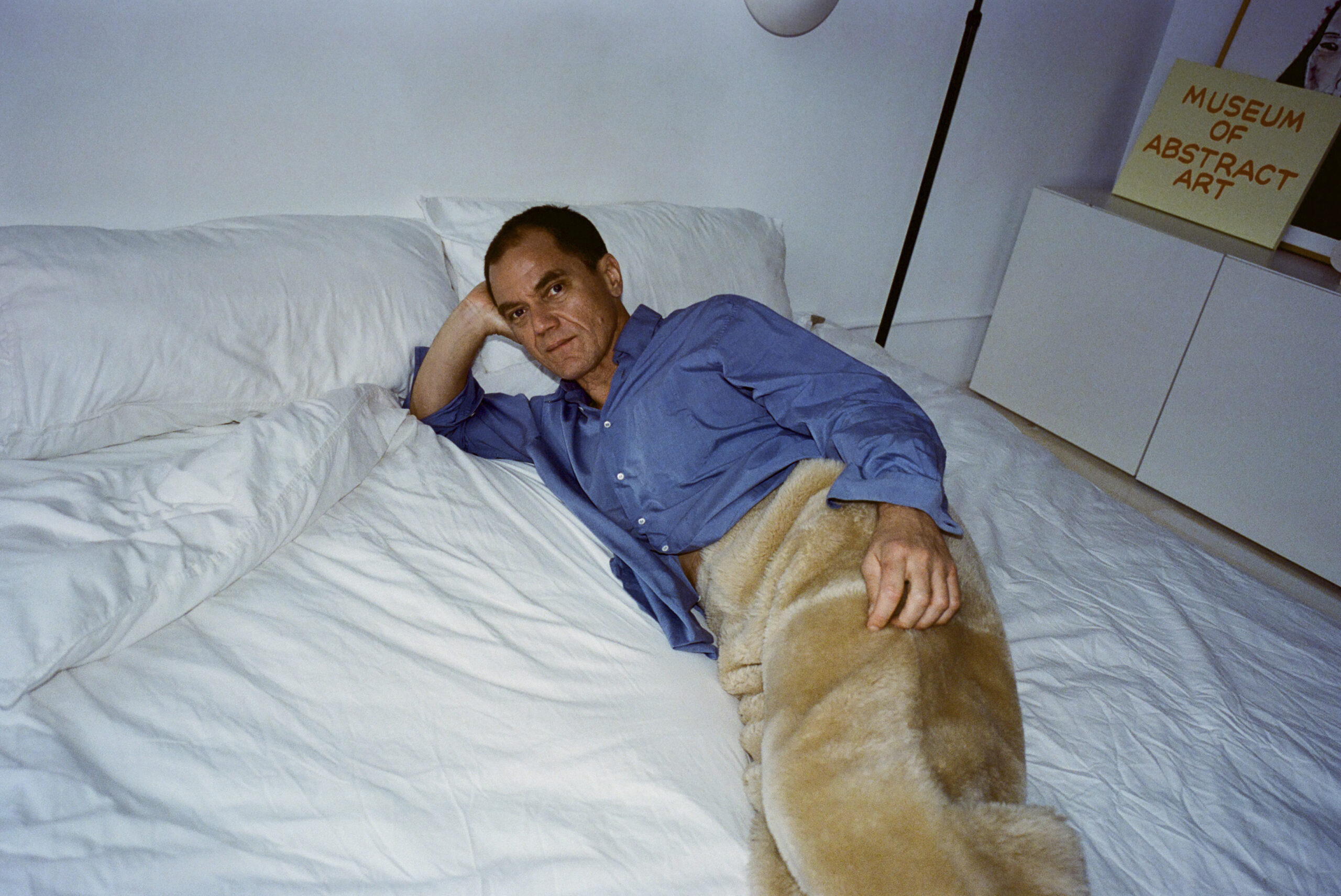
Vintage Loro Piana Shirt Talent’s Own. Ezio Pants in Creamy Cashmere Mélange Loro Piana.
BUTLER: And watching your Iggy Pop cover. You’re a rock star, man.
SHANNON: Oh, man. It was like a fork in the road early on. It was like, “Do I do acting or music?” And I went with acting, honestly, because I think music is harder. With acting, you have to find some other people that are essentially a lot more responsible than you are and convince them that you could be a part of something that they’re creating. But if you want to make your own music, you have to make something from scratch and then try and convince the world that they should give a shit about it, and that always scared me. But I guess the irony is that I love music so much, probably even more than movies and stuff, so I listen to a lot more music than I do watch movies or TV.
BUTLER: Right. It makes sense, the amount of soul that you got. Also, Waiting for Godot was my first time getting to see you on stage, and on stage there’s no editor. And so to get to see your rhythm and to feel the musicality of it was so impressive to me.
SHANNON: Oh, I can’t believe you would even notice something like that. That means you’re really paying attention. Well, for me, every time I walk on stage, I’m not trying to put across any sort of pre-arranged situation. I mean, I guess to a certain extent that’s disingenuous because there is an agreed-upon order of events and a script, but I really like just not having any idea what’s going to happen and just making it all about listening and responding. And I think if you do that, it can have a musicality.
BUTLER: Oh, man. Something Paul told me in a separate note was how great you are at karaoke.
SHANNON: Oh, really?
BUTLER: He said, “Mike will choose a song you never expected him to choose and then he’ll just kill it.” And I wonder what karaoke songs you’ve chosen more than any other, or what’s the first one that comes to your mind right now where you’re like, “I could see myself choosing that song?”
SHANNON: Well, if I really want to make people uncomfortable and anxious, which is by and large what I like to do at karaoke anyway, I’ll sing “Russians” by Sting. I’m always amazed when they actually have “Russians” as an option on the karaoke machine. It’s a very difficult song to sing because it’s very hard to sing like Sting. But the most fun song to sing for me is “Wild Wild Life” by Talking Heads. That’s a burner, man.
BUTLER: I love that. I’m writing this down right now. I always get very shy at karaoke, and I’m inspired by your commitment. Paul had told me about you’re performing with Jason Narducy [of Verboten]. You toured with him last year, right? Doing R.E.M.?
SHANNON: Yeah. Last year was the 40th anniversary of R.E.M.’s album Murmur, and it was the 40th anniversary of this club in Chicago called Metro, and the first show at Metro was R.E.M., so we put together this performance to commemorate the 40th anniversary of everything and it went over pretty good. And then Jason’s agent was there and he said, “You guys should tour this.” And we did. So now we’re touring this year because it’s the 40th anniversary of Fables of the Reconstruction.
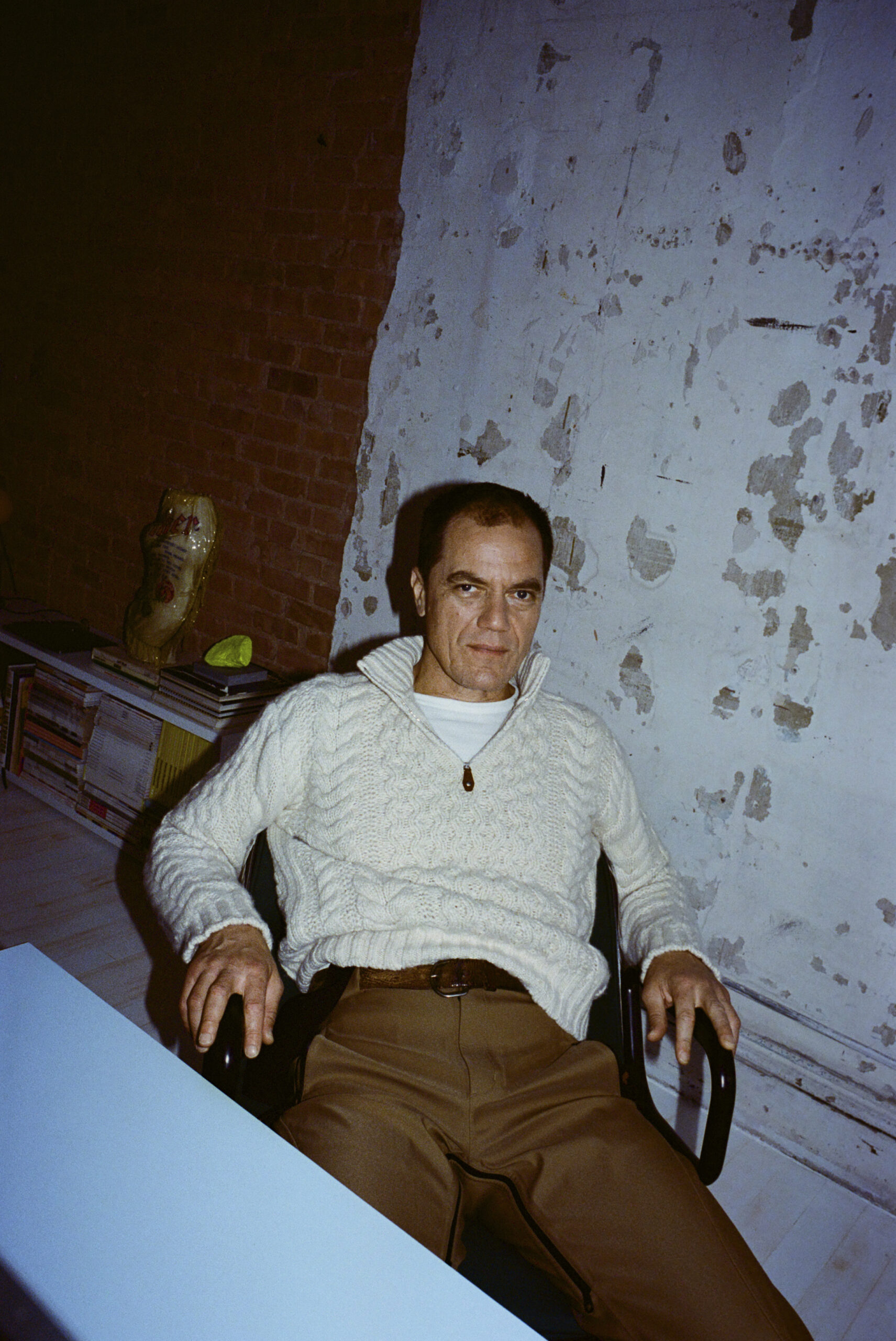
Valduggia Halfneck Sweater in Pale Latte, T-Shirt, and Bia Pants in Dusty Chestnut Loro Piana. Belt Talent’s Own.
BUTLER: What time of year are you doing that?
SHANNON: Our first show is on Valentine’s Day of 2025. We’ll be at Pappy and Harriets in Joshua Tree.
BUTLER: Oh, yeah. I just drove by there the other day.
SHANNON: And the next night we’ll be at the Bellwether in L.A., and it goes a month from Valentine’s Day.
BUTLER: Well, I’ve got to come to one of those shows. Maybe I’ll drive out to Joshua Tree and see you guys.
SHANNON: I hear that place is cool. I’ve never been there.
BUTLER: I’m so excited to finally get to see you on stage as a rock star.
SHANNON: I mean, I’m borrowing a lot, but it tickles me because all the members of the band have seen us do the show and a few of them have actually gotten up and played with us. They seem to get a kick out of it, so it’s cool.
BUTLER: Two last things, and then I’ll let you go.
SHANNON: Okay.
BUTLER: Jeff told me that your improv comedy is unparalleled.
SHANNON: Oh, really?
BUTLER: Yeah. He heard a legend that there was an improv duo in New York and that when one would get sick, they could call you and you could fill in for either of them. And he says his films are so precisely scripted that he doesn’t often get to see you improv in that way. His life’s dream is to have you host Saturday Night Live. Would you like to?
SHANNON: They have never asked me, Austin.
BUTLER: They’ve got to.
SHANNON: They’ve never asked me once.
BUTLER: Really? Would you want to do it?
SHANNON: I mean, at this point, I’m like, there’s a statute of limitations, man. If I did do it, I’d have to bitch about how long it took for them to ask me to do it. But yeah, I’d do it. I mean, I know so many people that have been on that show, and I came up acting in Chicago. My theater that I’m a member of is a block away from Second City, and we all used to go to the same bar, all them improv folks.
BUTLER: Man, I would love to go see that.
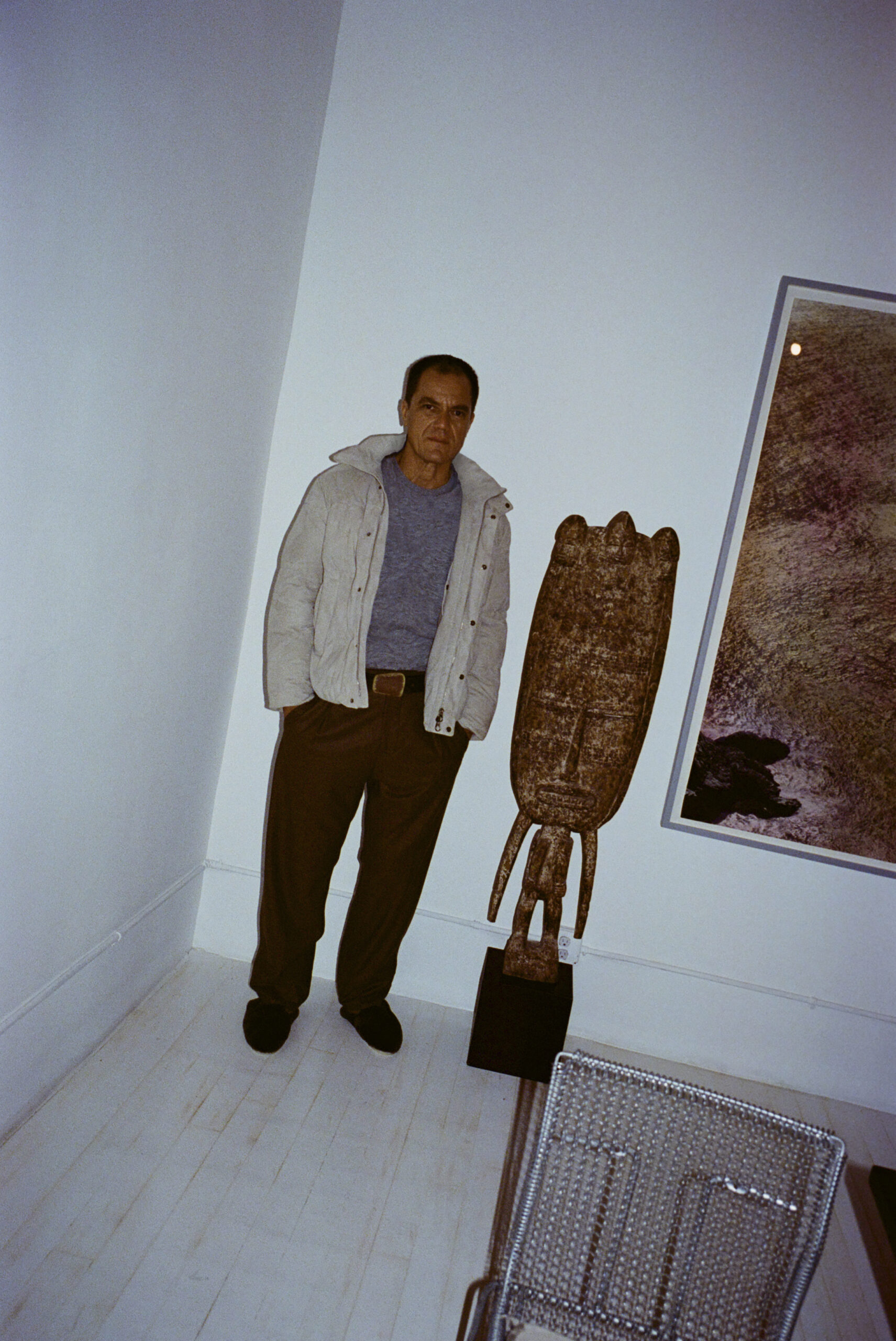
Flavio Puffer in Grigio Pietra, T-Shirt, Reinga Pants in Scottish Tundra Mélange, and Venice Walk Loafer in Naturale Loro Piana. Belt Talent’s Own.
SHANNON: Well, there is a really rich tradition of improv scholarship, particularly in Chicago. Lots of legendary teachers. There’s a fella named Del Close who was the improv guru that a lot of people in comedy like Mike Myers will say, “Del Close taught me everything I know.” But I didn’t actually go to those classes. I just got tangled up with this really weird group. We were called “Bang Bang Spontaneous Theater.” We refused to even call ourselves improv.
BUTLER: Spontaneous theater?
SHANNON: Yeah. And we were doing it out of a coffee house, even if it was full. And we called it “spontaneous theater” because the rule was that you weren’t just supposed to be funny. Anything goes. You should try to do a serious scene, or an abstract scene, an expressionistic scene. You could go up there and not say anything. So I did that for years, and the group got quite large. We started at a coffee house and then by the end of it, we had so many people in the group we had to move to a bigger space and actually got to work at some pretty nice theaters in Chicago. But it’s been defunct for a long time.
BUTLER: Wow. What a cool idea. I guess as you’re saying that, it makes sense seeing how newly alive you are every take. That is really, really fascinating.
SHANNON: It really was a gift, and it’s an interesting gift because when you’re up there at 11 PM on a Wednesday night and there’s five bored-looking people drinking their cafe au laits and staring at you, you’re not necessarily thinking, “This is such a gift.” But 20 years later you’re like, “Thank god I did that.” It’s very funny how life works.
BUTLER: Wow. So this feels like an appropriate way to end. The End, at its core, is asking: “How do we live when the end is near?” What’s your answer to that question?
SHANNON: Oh, damn. Man.
BUTLER: Right?
SHANNON: That’s heavy. I mean, full disclosure, this year really took a toll on me for a lot of different reasons. I worked too much and went through some personal stuff. And now that I have some time off, I’ve been trying to focus on–I hate the term self-care, it always makes me slightly nauseous, but I guess it’s some version of that where I’m really trying to calm down, get my wits about me, and find some equilibrium. So I’ve been reading a lot of metaphysics and spiritual stuff, and I was reading this book on the subway about staying in the present, and it’s amazing how many people have written about this very simple thing. You would think that we wouldn’t be capable of doing anything else. Why do other options even exist? And yet, for some strange reason, they do. I felt impending doom ever since I was a kid, when it was all about nuclear war or that the Russians were going to kill us. And so many people in my generation have been dealing with this anxiety since they were little. Like climate change, that’s been a problem for decades. When I was a teenager, I was canvassing for this Public Interest Relations Group and I would go door to door asking people, “Don’t you want clean air and clean water and all these things?” Of course, I was asking for money, which is always irritating, but my heart was in the right place, and so many doors just slammed in my face. I was like, “How do people not care about this?” It confounded me. So a lot of the work I’ve done has been like, “Hey everybody, think about this.” I try to pick things that are provocative and make people consider our common trials and tribulations, because I know that I’m not going to be the one that comes up with the molecule that replaces the atmosphere or somehow gets greenhouse gases to disappear. That’s not me. I could go back to school tomorrow and study for 20 years and I’m not going to come up with anything that’s going to help a damn lick. The only thing I can really do is, through my work, try to keep these concerns at the forefront. Have you ever felt that way, or does art just ask more questions? I don’t know.
BUTLER: I don’t know. All I can know is my own experience of it. And I felt it watching your movie, where it tills the soil and it overturns something in my mind and in my heart and makes me think about things a little differently. That makes a difference in my life. And I imagine it makes a difference in the lives of many, many others.
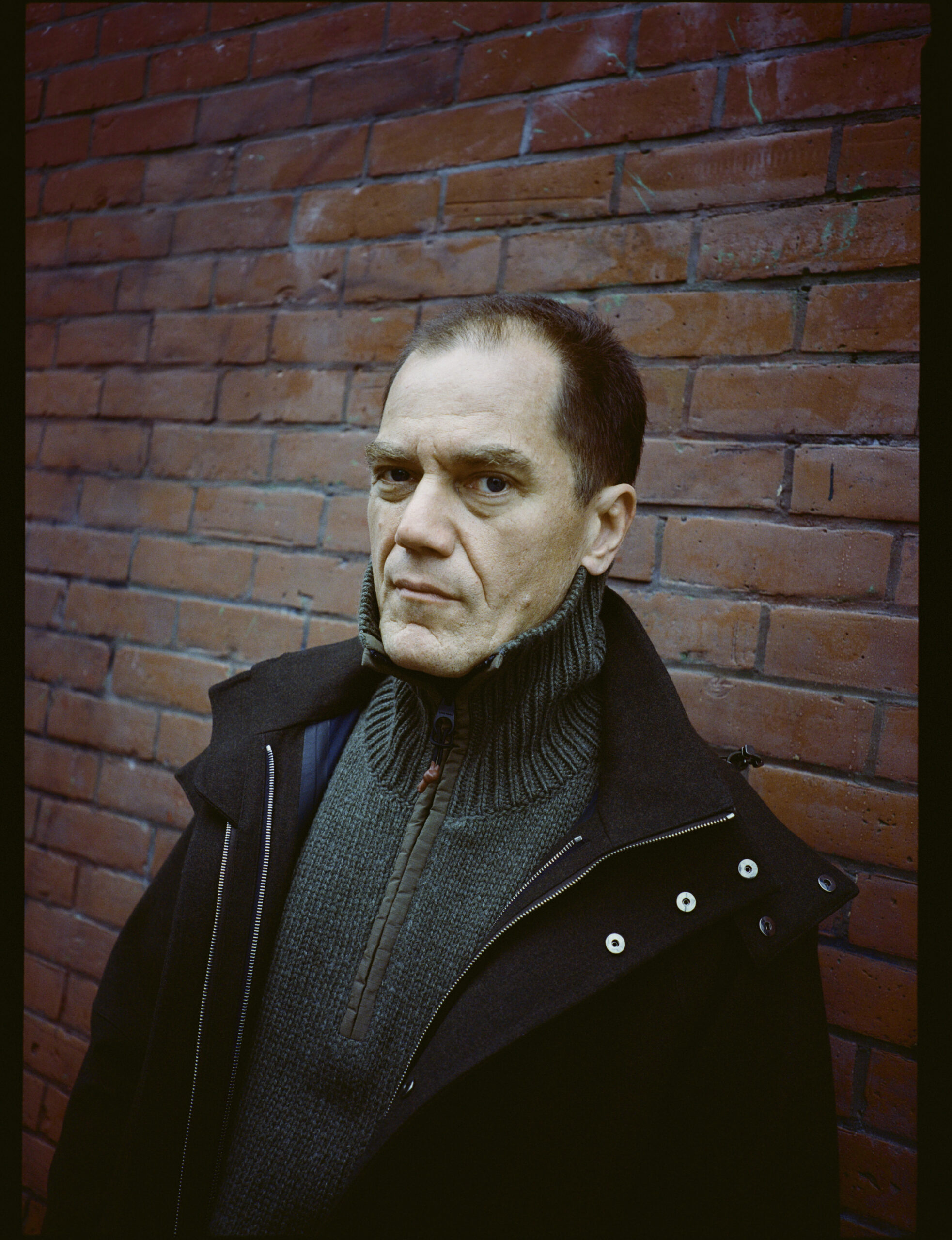
Guido Parka and Alpe di Mera Halfneck Sweater in Green Under Water Loro Piana.
SHANNON: But also, I don’t want to be a giant drag all the time. It’s nice when you excite people, or uplift them.
BUTLER: Well, you do it all, man. It’s been such a joy this last week to explore these different things that I never had seen, from you performing Iggy Pop to you reading that sorority letter. That thing cracked me up. I laughed so hard. You’re an inspiration to all the actors that I look up to, and you’re an inspiration to me, and you’re really putting good stuff out in the world. So, I appreciate you.
SHANNON: That is the damn sweetest thing I ever heard. Thank you, Austin.
BUTLER: Absolutely. I look forward to getting to talk and hang more.
SHANNON: All right, brother. Happy holidays.
———
Grooming: Rheanne White using Layrite at Tracey Mattingly.
Art Director: Oliver Shaw.
Photography Assistant: Chandler Bondurant.
Fashion Assistant: Izaake Zuckerman.
Production Assistant: Jordan Santisteban.

